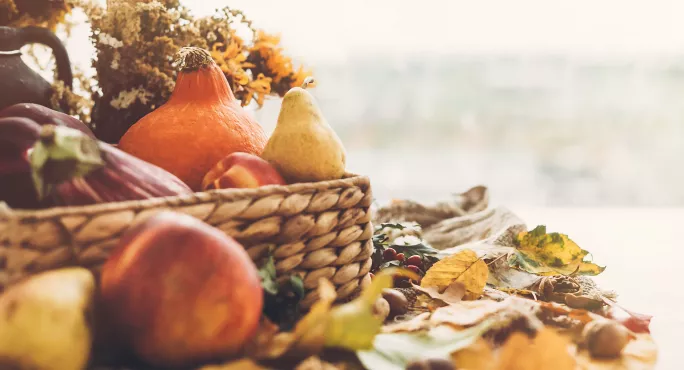Autumn brings with it a range of firsts in education: new schools, new classes, new jobs. But there’s one age-old tradition that remains the same no matter what year you’ve started, or what school you’ve moved to: the autumn harvest.
It is often the very first whole school celebration of the year and therefore has always been one of my favourites. By comparison to the festival of glitter that is December or the high emotion of the end of year celebrations in July, Harvest is often a muted affair. But what the event lacks in sparkle, it makes up for in rich opportunity and the mellowness of a pause and reflection after the chaotic first few weeks of term.
Harvest is often the poor relation of school celebrations: there’s no hastily constructed stage, no home-made props or costumes, no time carved out of lessons for rehearsals. And yet, the potential reach of a Harvest celebration is huge. There’s just so much to take away from it, from learning about where food comes from, food miles, seasons, weather and poverty and hunger, to how plants grow, months of the year, farming, mechanisation, industrial revolutions and diet.
It’s about much more than some dented soup cans and almost out of date battered tins of corned beef.
Autumn Days
The statutory letter goes out and gets forgotten. And so begins the last minute tin treasure hunts carried out at home, and the (hasty) decoration of boxes with crepe paper and ribbons. These boxes are brought to the front of the school hall or church - it doesn’t take long for them to pile up alongside an array of oddly-shaped vegetables.
As the food is presented, the sounds of the early years doing their best dingle-dangle scarecrows impressions while singing about their flippy-floppy hats is followed by a performance of Autumn Days or a We Plough the Field by key stage 2.
Then it’s time for the headteacher or local vicar to step up - they will have thought of another novel way to explain the significance of the occasion through the production of various fruits and vegetables or PowerPoint slides of combine harvesters in golden fields of wheat.
My favourite ever harvest was at my previous school - the vicar was an amateur magician and incorporated undisclosed explosions, fire and conjuring during his service in church.
The SLT were in mass panic: had the congregational address been adequately risk assessed?
Sow the seeds of friendship
Harvest is a time for us to be together as a school community, to be thankful for what we have and to share with others who may be in need. It is also a moment to take stock of how our communities are changing: no longer are harvest gifts of food and fresh produce being asked for but non-perishables and toiletries to support local food banks. Harvest can serve to highlight the huge disparity within a community and the real poverty in which many of our pupils are living.
As we gather to celebrate and give thanks for what our earth can provide, and smile as our pupils sing about plenty, it is worth reflecting on a song sung at my own children’s school harvest. The lyrics talk about at the effect “one kind person” could have if they chose to “sow the seeds of friendship”.
In a time of real need for many of our communities, pupils and families, Harvest is a time to ensure that we too sow the seeds of friendship and support across our schools, and never forget to tend to the wider educational seeds and attitudes we plant and cultivate every day.
Emma Turner is the research and CPD lead for Discovery Schools Trust, Leicestershire




